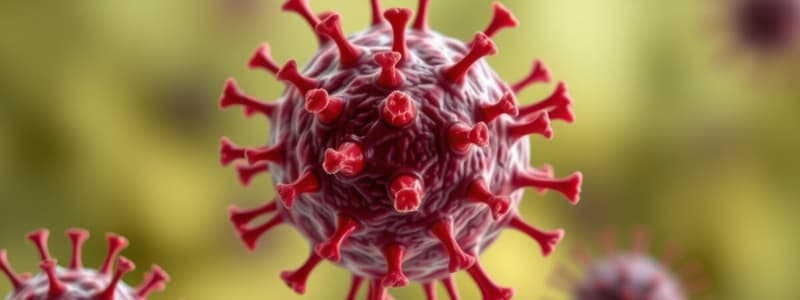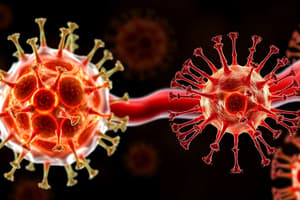Podcast
Questions and Answers
What role do phagocytes play in innate immunity?
What role do phagocytes play in innate immunity?
- They destroy infected or tumor cells.
- They produce antibodies.
- They ingest and digest pathogens. (correct)
- They enhance blood flow to infection sites.
How do Memory T cells function in adaptive immunity?
How do Memory T cells function in adaptive immunity?
- They provide a quick response upon re-exposure to a pathogen. (correct)
- They destroy all foreign pathogens immediately.
- They stimulate the production of phagocytes.
- They produce antibodies against pathogens.
Which of the following correctly defines the role of the complement system in innate immunity?
Which of the following correctly defines the role of the complement system in innate immunity?
- It primarily activates the T cell response.
- It produces natural killer cells.
- It enhances phagocytosis and can lyse pathogens. (correct)
- It synthesizes antibodies for target pathogens.
What is a common characteristic of viruses?
What is a common characteristic of viruses?
Which pharmacological treatment specifically targets fungal infections?
Which pharmacological treatment specifically targets fungal infections?
What mechanism allows microbes to evade the host immune response?
What mechanism allows microbes to evade the host immune response?
Which type of immune system disorder involves exaggerated immune responses?
Which type of immune system disorder involves exaggerated immune responses?
What is the primary function of B cells in adaptive immunity?
What is the primary function of B cells in adaptive immunity?
Which of the following treatments enhances or modulates the immune system?
Which of the following treatments enhances or modulates the immune system?
Which of the following is a characteristic of prokaryotic organisms?
Which of the following is a characteristic of prokaryotic organisms?
What is the main difference between innate immunity and adaptive immunity?
What is the main difference between innate immunity and adaptive immunity?
Which component of the immune system is primarily responsible for producing antibodies?
Which component of the immune system is primarily responsible for producing antibodies?
How do viruses differ from bacteria regarding their replication?
How do viruses differ from bacteria regarding their replication?
Which type of immune response is stimulated by vaccinations?
Which type of immune response is stimulated by vaccinations?
What is a major role of cytokines in the immune system?
What is a major role of cytokines in the immune system?
Which statement accurately describes the role of the microbiome?
Which statement accurately describes the role of the microbiome?
What defines a virulence factor in microbial pathogenesis?
What defines a virulence factor in microbial pathogenesis?
Which type of organism is classified as a eukaryote?
Which type of organism is classified as a eukaryote?
What is a common characteristic of helminths in terms of their relationship with hosts?
What is a common characteristic of helminths in terms of their relationship with hosts?
Study Notes
Innate Immunity
- Definition: The body's first line of defense against pathogens; non-specific and immediate response.
- Components:
- Physical Barriers: Skin, mucous membranes.
- Chemical Barriers: Antimicrobial substances (e.g., lysozyme, acidity).
- Cellular Components:
- Phagocytes: Macrophages, neutrophils.
- Natural Killer (NK) Cells: Target virus-infected and tumor cells.
- Inflammatory Response: Increases blood flow, recruits immune cells to sites of infection.
- Complement System: Series of proteins that enhance phagocytosis and lyse pathogens.
Adaptive Immunity
- Definition: Specific immune response that develops over time; involves memory.
- Components:
- Lymphocytes:
- B Cells: Produce antibodies; responsible for humoral immunity.
- T Cells:
- Helper T Cells (CD4+): Assist other immune cells.
- Cytotoxic T Cells (CD8+): Destroy infected cells.
- Antibodies: Proteins that specifically recognize and neutralize pathogens.
- Memory Cells: Long-lived cells that respond more rapidly upon re-exposure to the same pathogen.
- Lymphocytes:
Microbial Infections
- Types of Microbes:
- Bacteria: Prokaryotic organisms; can be pathogenic or beneficial.
- Viruses: Acellular; require host cells to replicate.
- Fungi: Eukaryotic organisms; can cause infections in immunocompromised individuals.
- Parasites: Organisms living on or in a host; can be unicellular or multicellular.
- Pathogenesis: Mechanisms by which microbes cause disease, including:
- Adherence to host cells.
- Invasion and colonization.
- Toxin production.
- Evasion of host immune response.
Pharmacological Treatments
- Antibiotics: Target bacterial infections by inhibiting growth or killing bacteria.
- Antivirals: Inhibit viral replication; often specific to certain viruses.
- Antifungals: Treat fungal infections; can target cell membrane or cell wall synthesis.
- Immunotherapy: Enhances or modulates the immune system; includes monoclonal antibodies and checkpoint inhibitors.
- Vaccination: Stimulates adaptive immunity to provide long-lasting protection against specific pathogens.
Immune System Disorders
- Hypersensitivity Reactions: Exaggerated immune responses; includes allergies and anaphylaxis.
- Autoimmune Diseases: Immune system mistakenly attacks the body's own tissues (e.g., rheumatoid arthritis, lupus).
- Immunodeficiencies: Reduced immune response; can be primary (genetic) or secondary (acquired, e.g., HIV/AIDS).
- Chronic Inflammation: Prolonged inflammatory response that can lead to tissue damage and disease (e.g., asthma, inflammatory bowel disease).
Innate Immunity
- First line of defense against pathogens; operates non-specifically and immediately.
- Physical Barriers: Includes skin and mucous membranes that block pathogen entry.
- Chemical Barriers: Comprise antimicrobial substances like lysozyme and acidic environments that deter microbes.
- Cellular Components:
- Phagocytes: Such as macrophages and neutrophils that engulf and digest pathogens.
- Natural Killer (NK) Cells: Target and destroy virus-infected and tumor cells.
- Inflammatory Response: Promotes increased blood flow and recruits immune cells to infected areas.
- Complement System: A series of proteins that enhance the ability of antibodies and phagocytic cells to clear microbes and damaged cells.
Adaptive Immunity
- Specific immune response that develops over time; capable of remembering past infections.
- Lymphocytes:
- B Cells: Responsible for producing antibodies, key players in humoral immunity.
- T Cells:
- Helper T Cells (CD4+): Support various immune functions.
- Cytotoxic T Cells (CD8+): Specialized in destroying infected cells.
- Antibodies: Proteins designed to specifically recognize and neutralize particular pathogens.
- Memory Cells: Long-lasting cells that enable a quicker immune response upon re-exposure to pathogens.
Microbial Infections
- Types of Microbes:
- Bacteria: Prokaryotic organisms that can be harmful or beneficial to hosts.
- Viruses: Acellular entities that rely on host cells for replication.
- Fungi: Eukaryotic organisms that can infect immunocompromised individuals.
- Parasites: Organisms that depend on a host for survival; could be unicellular or multicellular.
- Pathogenesis: The various mechanisms by which microbes cause disease, including:
- Adhering to host cells.
- Invading and colonizing host tissues.
- Producing toxins.
- Evading the host’s immune response.
Pharmacological Treatments
- Antibiotics: Effective against bacterial infections, either inhibiting growth or killing bacteria.
- Antivirals: Target and inhibit the replication of specific viruses.
- Antifungals: Treat fungal infections by disrupting cell wall or membrane synthesis.
- Immunotherapy: Modifies or enhances the immune response, including treatments like monoclonal antibodies and checkpoint inhibitors.
- Vaccination: Stimulates adaptive immunity, fostering long-lasting protection against targeted pathogens.
Immune System Disorders
- Hypersensitivity Reactions: Overreactions of the immune system, including allergic responses and anaphylaxis.
- Autoimmune Diseases: Conditions where the immune system attacks its own tissues, examples include rheumatoid arthritis and lupus.
- Immunodeficiencies: Diminished immune responses that can be primary (genetic) or secondary (acquired, e.g., from HIV/AIDS).
- Chronic Inflammation: Ongoing inflammation that can cause tissue damage and lead to diseases like asthma and inflammatory bowel disease.
Immunity
- The body's ability to resist or eliminate pathogens, such as bacteria, viruses, fungi, and parasites.
- Innate Immunity:
- Acts as the first line of defense, offering a non-specific response.
- Comprises physical barriers like skin and mucous membranes, and immune cells such as phagocytes and natural killer cells.
- Key features include the inflammatory response and the complement system, which enhance the immune defense.
- Adaptive Immunity:
- Provides a specific response to pathogens with the involvement of lymphocytes.
- B cells produce antibodies that neutralize pathogens, while T cells have helper and cytotoxic roles.
- Memory cells formed during the initial exposure allow for a faster response to subsequent infections.
- Key Components:
- Antibodies: Proteins from B cells that specifically target and neutralize pathogens.
- Antigens: Unique molecules found on pathogens that are recognized by the immune system as threats.
- Cytokines: Proteins that regulate and mediate immune responses and inflammation.
- Vaccination:
- Introduces a harmless version of a pathogen to stimulate the adaptive immune response.
- Helps create memory cells, ensuring a quicker and more effective response on future encounters.
Microbiology
- The scientific study of microorganisms, encompassing bacteria, viruses, fungi, and parasites.
- Microorganisms:
- Bacteria:
- Single-celled prokaryotic organisms that can be beneficial (e.g., gut flora) or pathogenic (causing disease).
- Reproduce asexually via binary fission, classified into types such as Gram-positive, Gram-negative, anaerobic, and aerobic.
- Viruses:
- Acellular entities that require host cells for replication, consisting of nucleic acid (DNA/RNA) and a protein coat.
- Cause diseases by invading host cells and hijacking their machinery for reproduction.
- Fungi:
- Eukaryotic organisms that can be unicellular (yeasts) or multicellular (molds).
- Essential for decomposition and nutrient cycling; some species are pathogenic, such as Candida and Aspergillus.
- Parasites:
- Organisms that live on or within a host, obtaining nutrients at the host's expense.
- Includes protozoa, helminths (worms), and ectoparasites like lice and ticks.
- Bacteria:
- Microbial Pathogenesis:
- Refers to the mechanisms through which microorganisms induce disease.
- Includes factors like virulence factors (toxins, adherence properties) and host susceptibility which can influence disease outcomes.
- Microbiome:
- Consists of the variety of microorganisms inhabiting specific environments, particularly the human body.
- Plays a vital role in digestion, metabolism, and the regulation of the immune system.
Interrelationship Between Immunity and Microbiology
- The immune system is designed to detect and respond to microbial infections effectively.
- Microbial antigens serve as triggers for the adaptive immune response.
- Some successful pathogens possess the ability to evade or manipulate the immune responses, such as through antigenic variation.
- A solid understanding of microbiology is crucial for the development of effective vaccines and treatments targeting infectious diseases.
Studying That Suits You
Use AI to generate personalized quizzes and flashcards to suit your learning preferences.
Description
Test your knowledge on the two main types of immunity: innate and adaptive. This quiz covers the components, functions, and responses of both immune systems. Dive deep into the roles of phagocytes, lymphocytes, and the complement system.




